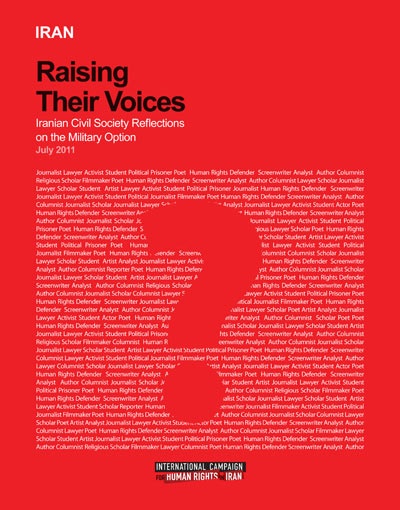 Attack Ruinous for Human Rights and Democratic Change in Iran – (26 July 2011) Influential and well-informed members of Iranian civil society believe that military action against Iran would lead to further political repression, deeper enmity between the Iranian people and the United States, and severe humanitarian problems, according to a report published today by the International Campaign for Human Rights in Iran.
Attack Ruinous for Human Rights and Democratic Change in Iran – (26 July 2011) Influential and well-informed members of Iranian civil society believe that military action against Iran would lead to further political repression, deeper enmity between the Iranian people and the United States, and severe humanitarian problems, according to a report published today by the International Campaign for Human Rights in Iran.
The 38-page report, Raising Their Voices: Iranian Civil Society Reflections on the Military Option, presents the viewpoints of 35 prominent Iranians living inside the country on the domestic consequences of an attack by the United States or its allies. These Iranians include human rights defenders, activists, lawyers, journalists, writers, leading cultural figures, and members of the political opposition.
Those interviewed in the report are people outside the ruling establishment, many having faced censorship, harassment, and imprisonment for their opinions or activities.
“The potential of a pre-emptive military strike has gone up and down over the years, but seems to remain an option. The Iranian civil society voices in this report consider such a foreign military strike an utter disaster for the human rights situation in their country,” said Hadi Ghaemi, the Campaign’s spokesperson.
The Iranians featured in the report rejected justifications for military action against Iran based on human rights violations, saying a strike would not precipitate “regime change” and would even rally some reform-oriented citizens to the side of the government. One journalist who wished to remain anonymous said, “A foreign military attack would lead to many of the [Green] movement’s rank-and-file shifting their support to the same government they currently oppose.”
The interviewees unanimously expressed their grave concern that a military conflict would exacerbate the human rights situation and provide a pretext for the full militarization of the Iranian state, all the while increasing civil and political repression. Prominent lawyer Kambiz Norouzi said, “If the United States by itself or in cooperation with its allies attacks Iran, we will witness severe and widespread violations of human rights. No doubt all social layers will harmed…civil, social, and political freedoms will be extremely constrained.”
Other interviewees warned that military action would likely lead to an upsurge of political violence, threatening organizations and individuals considered enemies of the government. As one student activist said, “If war breaks out, democracy, human rights, and civil society will be the main losers. The Iranian government would militarize and such a militaristic government has the potential to carry out widespread killings of opponents.”
Given the mass executions of numerous political prisoners during the Iran-Iraq War, interviewees expressed strong fears about the fate of hundreds of defenseless political prisoners in the event of a conflict with the United States.
Furthermore, those interviewed for the report said a military conflict with Iran would undermine Iranian civil society and the pro-democracy movement, strengthen the current regime by stoking nationalism and dividing the opposition, and undercut the Iranian public’s goodwill toward the US. Film and theater director Behrouz Gharibpour said, “Any foreign power launching a strike will be the main loser because Iranians love their country and even if the conditions are not to our liking, we will not allow any foreign invasion. The United States caused many negative consequences with its support of the 1953 military coup and an attack today would have a lasting negative impact for decades to come.”
Some of the interviewees warned that a military strike would indeed be welcomed by hardline elements in the Iranian regime, as it would help them to strengthen their hold on power. “In today’s atmosphere they are waiting for any sort of excuse. This is because war is the regime’s lifeline. They depend on it. They can thrive in a war environment,” said Fakhralsadat Mohtashamipour, an activist who is currently in prison and interviewed with the Campaign before going to prison.
Finally, some interviewees expressed serious concerns that a military strike by the United States or its allies would have ruinous humanitarian, economic and environmental consequences.
The Campaign shares the concerns of the civil society leaders in the report that a military strike on Iran has dramatic ramifications not only for the human rights of Iranians, but for the integrity of human rights principles themselves. “International policymakers need to take into account the insights of Iranian civil society if they truly want to understand the impact and utility of the use of force,” concluded Ghaemi.
Download PDF of report
Listen to the Campaign’s Weekly Iran Rights Podcast
For the latest human rights developments in Iran visit the Campaign’s website
For interviews or more information:
Hadi Ghaemi, in New York: +1 917-669-5996
Aaron Rhodes, in Hamburg: +49 170-323-8314
